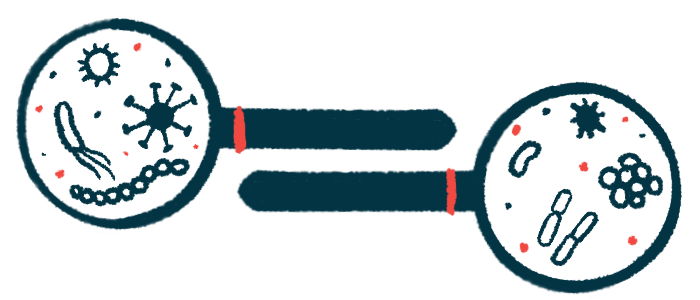Personalized phage therapy boosts CF lung function in small study
This approach results in decreased antibiotic resistance, bacterial load
Written by |

A personalized inhaled phage therapy targeting multidrug-resistant lung infections significantly reduces bacterial load and improves lung function in adults with cystic fibrosis (CF), according to a small study.
The experimental therapy was personalized by selecting phages that worked best against Pseudomonas aeruginosa strains in patients’ sputum samples. It also addressed potential treatment resistance by rendering bacteria that survived phage therapy more susceptible to antibiotics and less virulent, or less able to cause disease.
“In addition to bacterial killing, this phage therapy approach was associated with trade-offs in [P. aeruginosa] that resulted in decreased antibiotic resistance and reduced virulence in post-therapy [samples],” researchers wrote.
The study, “Personalized inhaled bacteriophage therapy for treatment of multidrug-resistant Pseudomonas aeruginosa in cystic fibrosis,” was published in Nature Medicine.
The abnormally thick mucus that builds up in the lungs of people with CF provides a breeding ground for bacteria such as S. aureus and P. aeruginosa. Antibiotics are the first-line treatment for these infections, but with long-term use, bacteria can become resistant, making these medicines less effective.
Bacteriophages are viruses to treat antibiotic-resistant lung infections
Bacteriophages, or phages for short, are viruses that can infect and kill bacteria without affecting human cells. They represent a promising approach to treat antibiotic-resistant lung infections in people with CF.
Biomx is developing an inhalable phage therapy called BX004, a cocktail of phages designed to destroy P. aeruginosa bacteria. In an early clinical study, BX004 outperformed a placebo in improving lung function in CF patients with P. aeruginosa infections. Over seven days of treatment, the P. aeruginosa strains remained constant, suggesting the bacteria did not become resistant to phage therapy.
However, like antibiotics, the development of phage-resistant bacteria is still a concern with long-term phage therapy.
To address this potential limitation, a team led by scientists at the Yale School of Medicine, in Connecticut, developed phages that target proteins on bacterial surfaces involved in antibiotic resistance or virulence. In this way, these phages not only kill the bacteria but render those that survive less virulent and/or more sensitive to antibiotics.
“A phage therapy strategy that leverages such a trade-off could result in improved clinical outcomes by decreasing bacterial burden and by selecting for surviving bacterial mutants that are less resistant to antibiotics or less virulent,” the team wrote.
Moreover, the phage therapy can be personalized for individual patients based on the susceptibility of P. aeruginosa strains in their sputum samples.
The team tested the inhalable phage therapies in eight women and one man, ages 22-46, with CF whose P. aeruginosa infection had become resistant to multiple antibiotics or did not respond to standard CF therapies.
When phage therapy was started, all patients were on intravenous (into-the-vein) antibiotics or had recently completed antibiotics. Two were receiving Symdeko (tezacaftor/ivacaftor). Regardless, all participants had persistent symptoms and/or clinical decline, despite comprehensive CF care, and severe pulmonary exacerbations, or a sudden worsening of symptoms.
Inhaled phage therapy was given twice daily for four inpatients or daily for five outpatients for 7-10 days. Six patients received phage cocktails of two or three phages, and three were given a single-phage therapy.
Levels of P. aeruginosa significantly lower 5-8 days after phage therapy
Five to 18 days after phage therapy, the levels of P. aeruginosa bacteria in sputum samples from all participants were significantly lower than before treatment. Similar findings were observed when sputum samples were tested at a later time point between 15 and 42 days.
In all participants, phage therapies improved lung function, as assessed by the amount of air exhaled in one second, by a mean of 8%, when measured 21-35 days after treatment. Those with better lung function before phage therapy improved by a mean of 11% versus 3.5% in patients with worse lung function before treatment.
“Phage therapy was associated with improved lung function, regardless of individualized differences in phage treatment strategies,” the team wrote.
When the researchers investigated phage resistance, they found all patient sputum samples contained one or more bacterial strains resistant to the phages used in therapy. Even so, these surviving bacteria showed decreased antibiotic resistance and reduced virulence in post-therapy sputum samples.
Further analysis revealed phage therapy did not alter the composition of bacterial communities in these patients, confirming that fewer P. aeruginosa didn’t allow for the growth of other bacterial species. In addition, pre- and post-therapy P. aeruginosa strains were closely related, meaning that any genetic changes in the bacteria were primarily driven by factors other than phages.
Phage nebulization was well tolerated without any adverse events reported. Four of the five outpatients reported fever, while three reported fatigue on days two and three of phage therapy, but no additional treatment was needed. The four inpatients did not report fever or any other symptoms after phage therapy.
“In a chronic lung disease such as CF, inhaled phage therapy may offer an effective therapeutic option,” the researchers wrote. “Further studies of this new therapeutic are currently underway in clinical trials, and our personalized phage therapy approach will similarly require larger clinical trials.”







